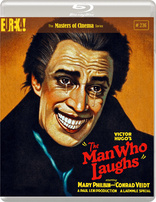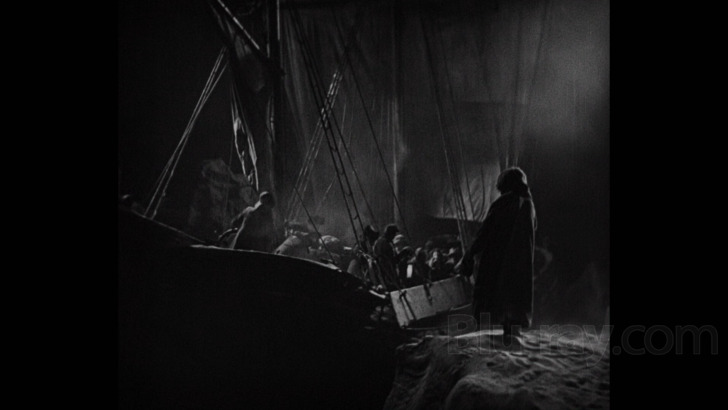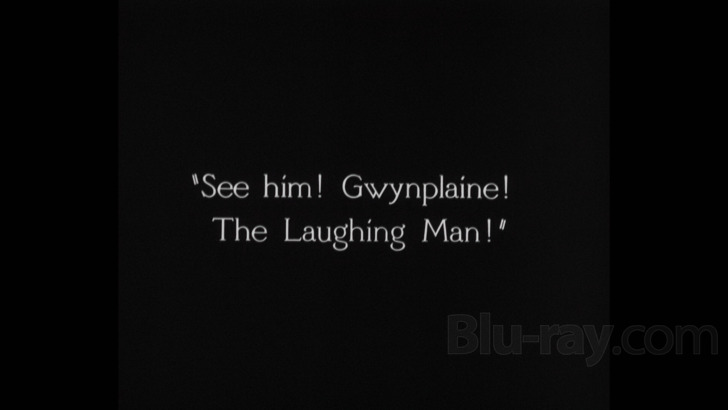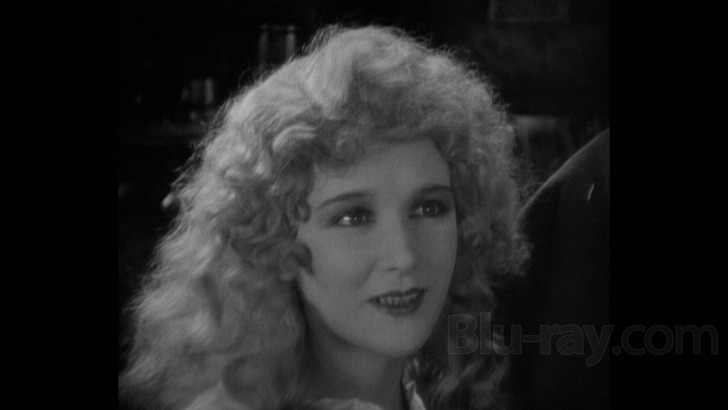The Man Who Laughs Blu-ray Movie
HomeThe Man Who Laughs Blu-ray Movie 
Masters of CinemaEureka Entertainment | 1928 | 110 min | Rated BBFC: PG | Aug 17, 2020

Movie rating
7.7 | / 10 |
Blu-ray rating
| Users | 0.0 | |
| Reviewer | 4.5 | |
| Overall | 4.5 |
Overview
The Man Who Laughs (1928)
In 1690, Lord Clancharlie returns from his exile to see his young son. The peer is captured by the King James II and before being killed, he is informed that his beloved son had been sold to the gypsies Comanchicos that carved a permanent grin on his face; they abandon the boy in the snowing winter, and while looking for shelter, he finds a baby hold in the arms of her dead mother. He brings the baby with him and they are welcomed by Ursus. Years later, Gwynplaine becomes a successful clown, and together with the blind Dea, they present plays for common people. Gwynplaine and Dea are in love for each other, but he refuses to marry her because of his ridiculous appearance. When the evil jester Barkilphedro discloses the origin of Gwynplaine, he plots a means to be rewarded by the Queen, jeopardizing the love of Gwynplaine and Dea...
Starring: Conrad Veidt, Mary Philbin, Olga Baclanova, Brandon Hurst, Cesare GravinaDirector: Paul Leni
| Horror | Uncertain |
| Drama | Uncertain |
| Romance | Uncertain |
| Mystery | Uncertain |
| Thriller | Uncertain |
Specifications
Video
Video codec: MPEG-4 AVC
Video resolution: 1080p
Aspect ratio: 1.21:1
Original aspect ratio: 1.2:1
Audio
Music: LPCM 2.0 Mono
Music: LPCM 2.0
Subtitles
None
Discs
Blu-ray Disc
Single disc (1 BD)
Packaging
Slipcover in original pressing
Playback
Region B (locked)
Review
Rating summary
| Movie | 5.0 | |
| Video | 4.5 | |
| Audio | 5.0 | |
| Extras | 4.0 | |
| Overall | 4.5 |
The Man Who Laughs Blu-ray Movie Review
An outstanding 4K restoration of the silent-era classic.
Reviewed by Neil Lumbard June 30, 2021As one of the great silent films of the 1920's, The Man Who Laughs is a haunting exploration of the turmoil of a disfigured young child named Gwynplaine. A group of savages commonly referred to throughout the land as comprachicos have gone throughout the countryside wrecking havoc and disfiguring the faces of young children. The film has been produced by the great Carl Laemmie (Frankenstein, Dracula).
One of these victims was the innocent Gwynplaine. In becoming a disfigured child his face took on a maniacal appearance which led to him becoming the laughingstock of his town. Gwynplaine starts to become a side-show attraction to the cruel audience gleefully laughing at his never-ending smile as he appears to them as a mere form of spectacle at the circus.
The one and only soul whom Gwynplaine connects to is the blind beauty Dea (Mary Philbin). Unlike the soul-crushing cruelty which he endures by circus attendees, Dea forms a romantic connection with him which is pure of heart. As Dea cannot see his face (carved into a smile), she connects to him on a deeply personal level which is not about physical beauty but about the radiance of Gwynplaine's heart.

An astonishing performance by Conrad Veidt.
The film has a new score performed by the Berklee School of Music. Featuring compositions done by a variety of students of this famed school, this was a huge project developed for the restoration initiative. This is one of the best efforts I have ever heard for a newly recorded score for a silent film. I don't use those words lightly. The musicians involved delivered a fantastic experience. The score even reminds one somewhat of the haunting work from composer Shirley Walker for Batman: The Animated Series (I would not be surprised at all if that iconic fan-favorite score was even an inspiration on some of the music cues). If only all classic film scores received this level of love and attention to detail.
The exquisite black and white cinematography by Gilbert Warrenton (Panic in Year Zero, Telephone Operator) is a visual stunner and helps draws audiences into the cinematic world created by the film with ease. The experience feels eerily hypnotic and a large part of this aspect is the visual cues by the cinematographer. Warrenton's efforts leave a long-lasting impression. The visuals also highlight the superb costumes by designers David Cox (It's a Great Life) and Vera West (Shadow of a Doubt).
Featuring tight editing by Edward L. Cahn (Surrender, Resurrection), The Man Who Laughs feels surprisingly punchy and energetic in the rhythm of the edit. This is no doubt one of the main reasons the film has remained a favorite of classic silent film enthusiasts. It doesn't slog through any of its takes or cuts. Rather, the editing and pace feels highly focused and compelling.
J. Grubb Alexander (Svengali, The Trail of the Octopus) delivers an excellent screenplay which is one of the film's greatest strengths. Having to live up to the original source story written by the legendary author Victor Hugo is no easy feat. The storytelling carries an authenticity in exploring both the pain felt by the chastised Gwynplaine and the beating heart of the character's emotions as he connects with Dea. An argument could be made that one of the primary reasons The Man Who Laughs has withstood the test of time so well is because of the nuanced romantic storytelling: it's absorbing and uplifts the heart.
There is an immense beauty to this silent classic which manages to grab hold of one's soul. The film was a passion project for it's director. Filmmaker Paul Leni (The Last Warning, The Cat and the Canary) had enormous ambitions for the project and its clear that there was a drive behind the filmmaking. Several sequences (such as the action-packed finale) are so ambitious in scope that one wonders how the producers even managed to pull of the scenes utilizing the technology and resources of the time.
As an adaptation of the classic novel written by the brilliant author Victor Hugo (Les Miserables), Leni had high stakes to live up to with the production. Thankfully, Leni's efforts ultimately paid off with the end result being a cinematic concoction which feels just as compelling today as it would have felt for audiences experiencing the film for the first time during the theatrical run in the 1920's.
The Man Who Laughs Blu-ray Movie, Video Quality 

Arriving on Blu-ray from Eureka Entertainment, The Man Who Laughs is presented in 1080p MPEG-4 AVC encoded high definition presentation in the original full frame aspect ratio. The release uses the 4K scan and restoration completed by Universal Pictures. The presentation on the release is quite similar to what is found on the Region A Flicker Alley edition (reviewed here).
However, the Eureka Entertainment release produced for the United Kingdom is a little bit different – similar overall, but grain is a bit more pronounced and some parts look slightly more rough. This is certainly a close match to the Flicker Alley edition and those in European countries will be fine to purchase this edition over the Flicker Alley release. Though I had a slight preference for the Flicker Alley presentation, The Man Who Laughs looks exceptional here and the 4K restoration is stunning to behold. Black levels are exceptional and the level of clarity (and definition) on display is top-notch.
The Man Who Laughs Blu-ray Movie, Audio Quality 

The release comes with two lossless audio options: uncompressed PCM 2.0 stereo with the Berklee Silent Film Orchestra Score (2018) and uncompressed PCM 2.0 stereo with the 1928 Movietone Score from the film's original release. The high-resolution audio on the Berklee orchestra score is top-notch throughout the entire presentation. The audio clarity is astonishing and makes the experience all the more enveloping. The original score recording quality is noticeably inferior to the brand new recording and should be considered as supplemental.
The Man Who Laughs Blu-ray Movie, Special Features and Extras 

Kim Newman on Paul Leni (HD, 12:23)
The Face Deceives (HD, 33:18) is a video essay by David Cairns & Fiona Watson.
Paul Leni and The Man Who Laughs (HD, 13:44) is a video essay by John Soister.
Stills Galleries:
Click through galleries presenting a selection of photographs related to the release and production of The Man Who Laughs.
Production Stills
Behind the Scenes
Costume / Make-up Tests
Exhibition / Trade Ads
Programs / Posters / Heralds
Memorabilia
The Man Who Laughs Blu-ray Movie, Overall Score and Recommendation 

The Man Who Laughs is a cinematic masterpiece. The silent film has managed to withstand the test of time and is regarded as one of the best achievements in silent film history. The great performance by Conrad Veidt (who inspired The Joker of Batman lore) is astonishing and a cinematic miracle. The maniacal smile is an iconic element of the silent classic.
Even after more than 100 years after production, The Man Who Laughs remains impressive and the new 4K restoration by Universal Pictures is well worth seeing. The Eureka Entertainment release includes some exclusive supplements not included on the Flicker Alley edition released in North America. Fans of the film residing in Region B territories will want to pick up the release. Highly recommended.
Similar titles
Similar titles you might also like

The Hunchback of Notre Dame
Masters of Cinema
1923

The Cat and the Canary
Masters of Cinema | Standard Edition
1927

The Seventh Victim 4K
1943

The Red Queen Kills Seven Times
La dama rossa uccide sette volte
1972

Mr. Sardonicus
Indicator Series
1961

Eyes Without a Face 4K
Les yeux sans visage
1960

Jug Face
2013

The Queen of Spades
Vintage Classics
1949

The Neon Demon
2016

Fedora
Masters of Cinema
1978

The Black Castle
Eureka Classics
1952

Night Tide
Indicator Series
1961

Dragonwyck
Indicator Series
1946

King Kong
90th Anniversary Edition
1933

The Phantom of the Monastery
El fantasma del convento / Indicator Series
1934

Laurin
1989

The Curse of the Crying Woman
La Maldición de la Llorona | Indicator Series | Standard Edition
1963

The Phantom of the Opera
1925

House of Dark Shadows
1970

Night of Dark Shadows
1971